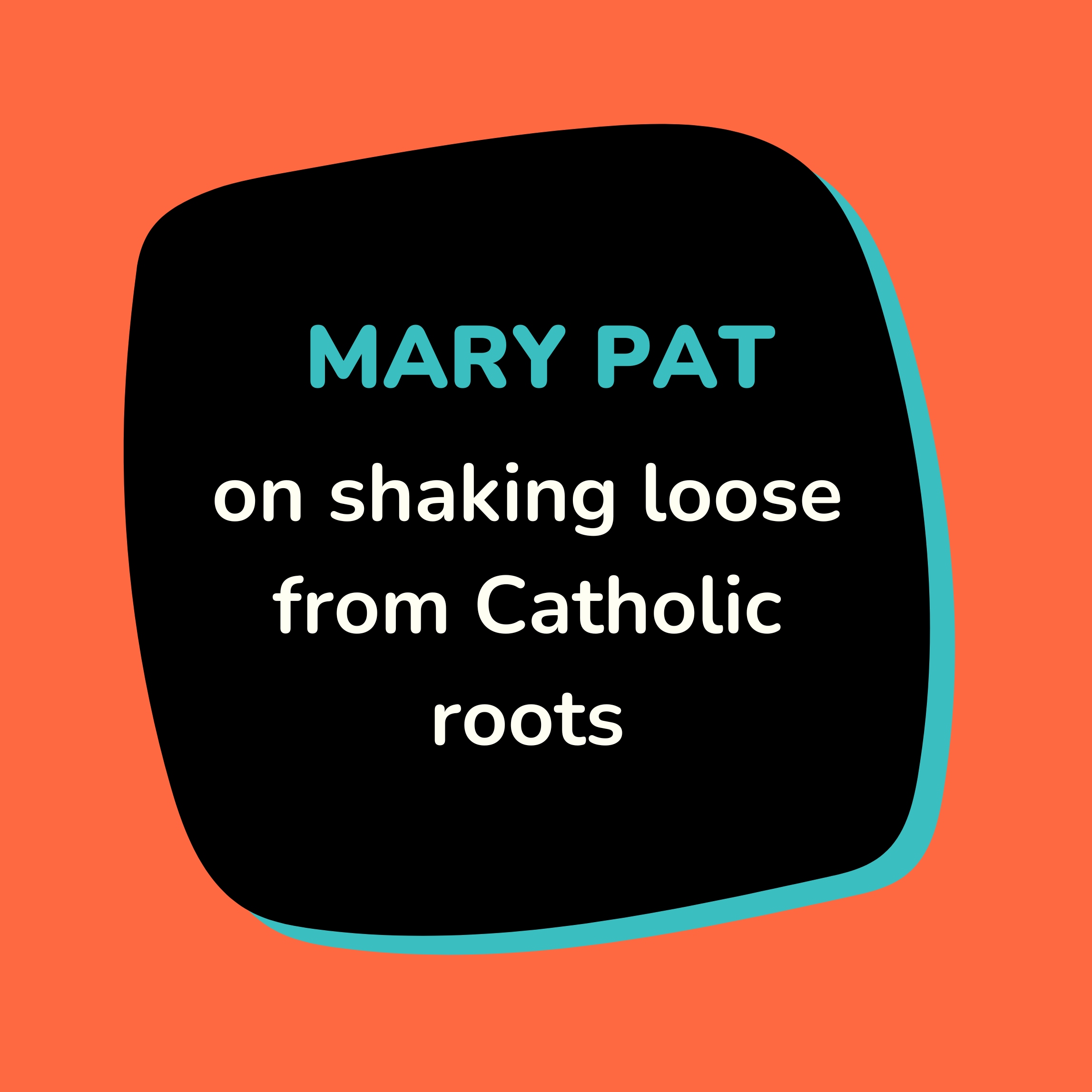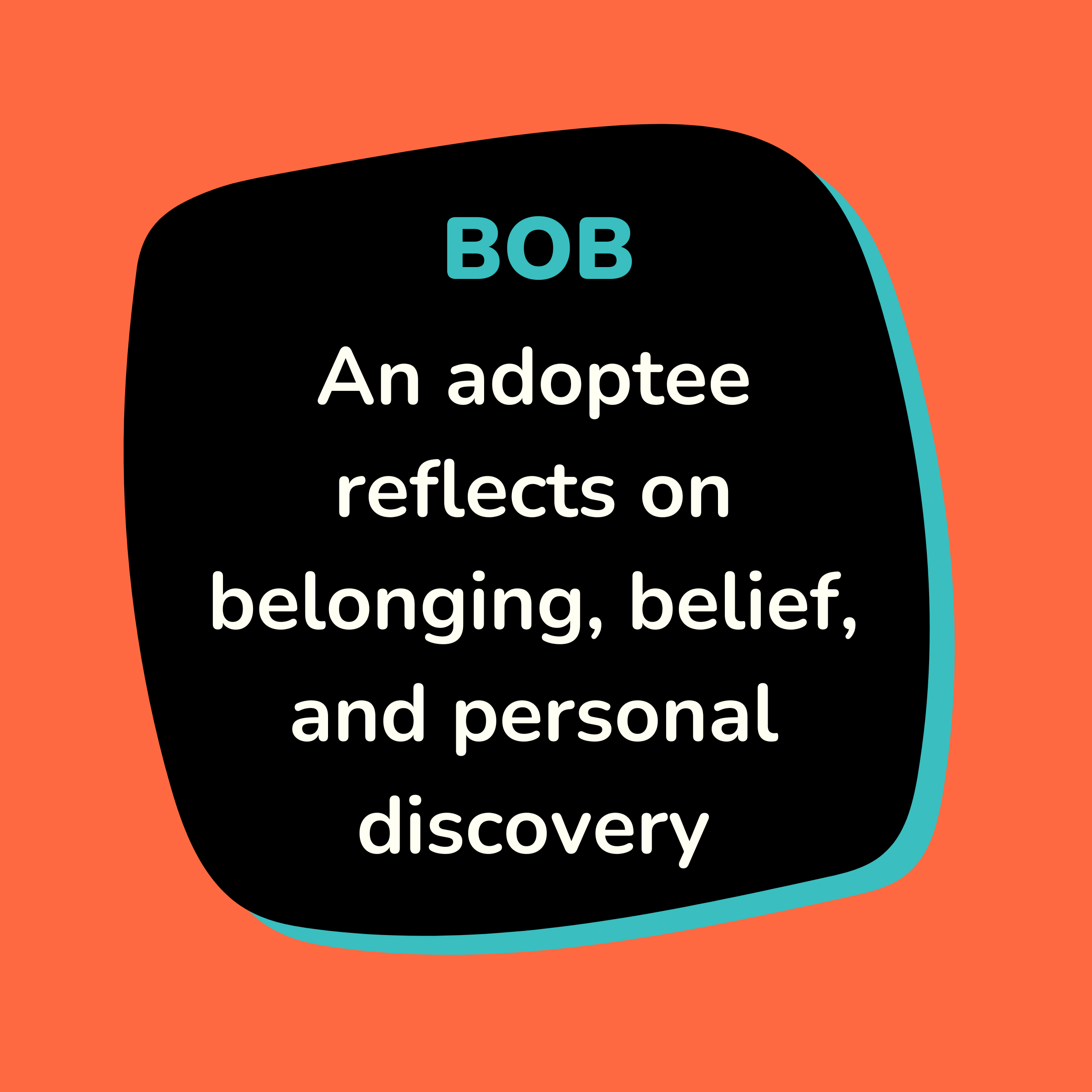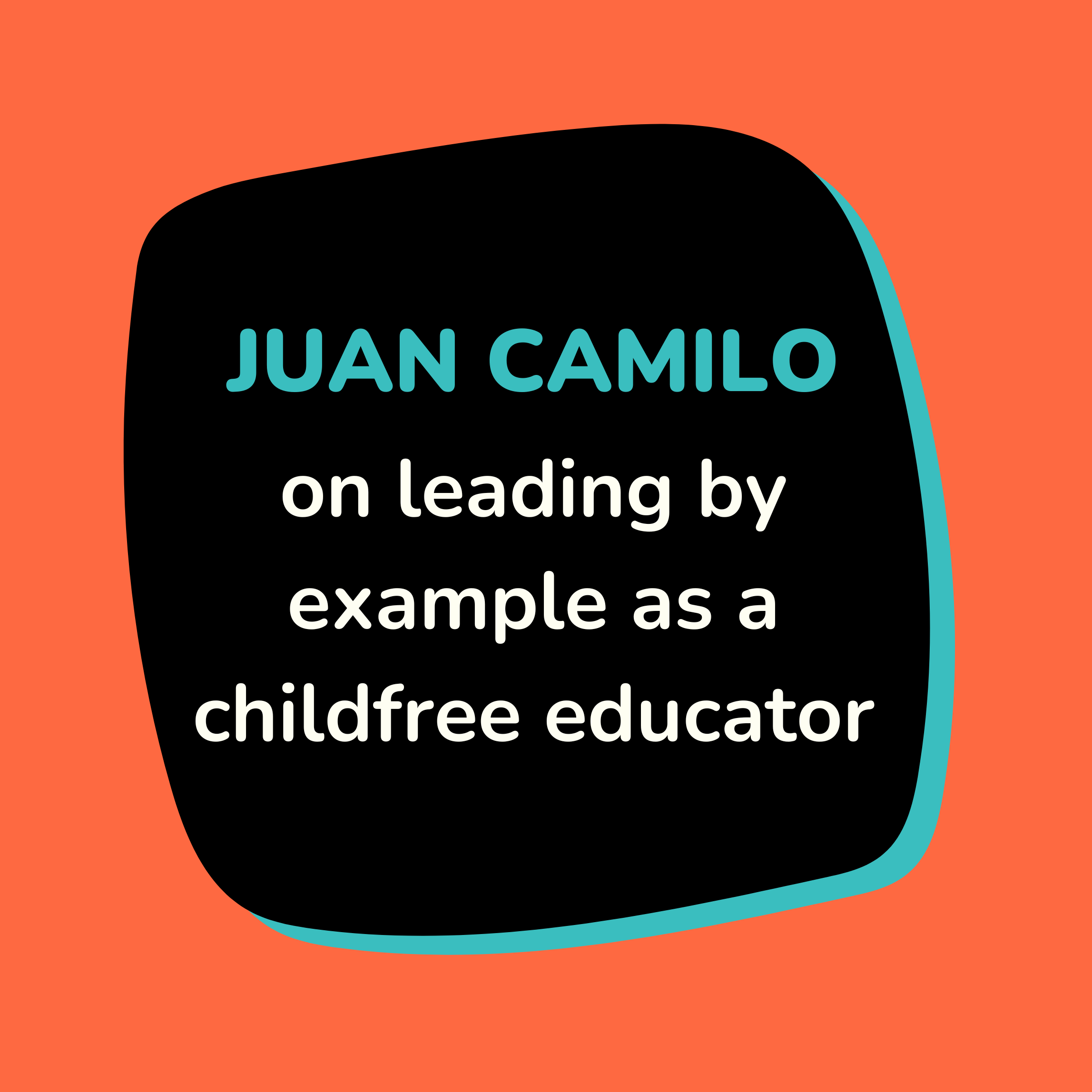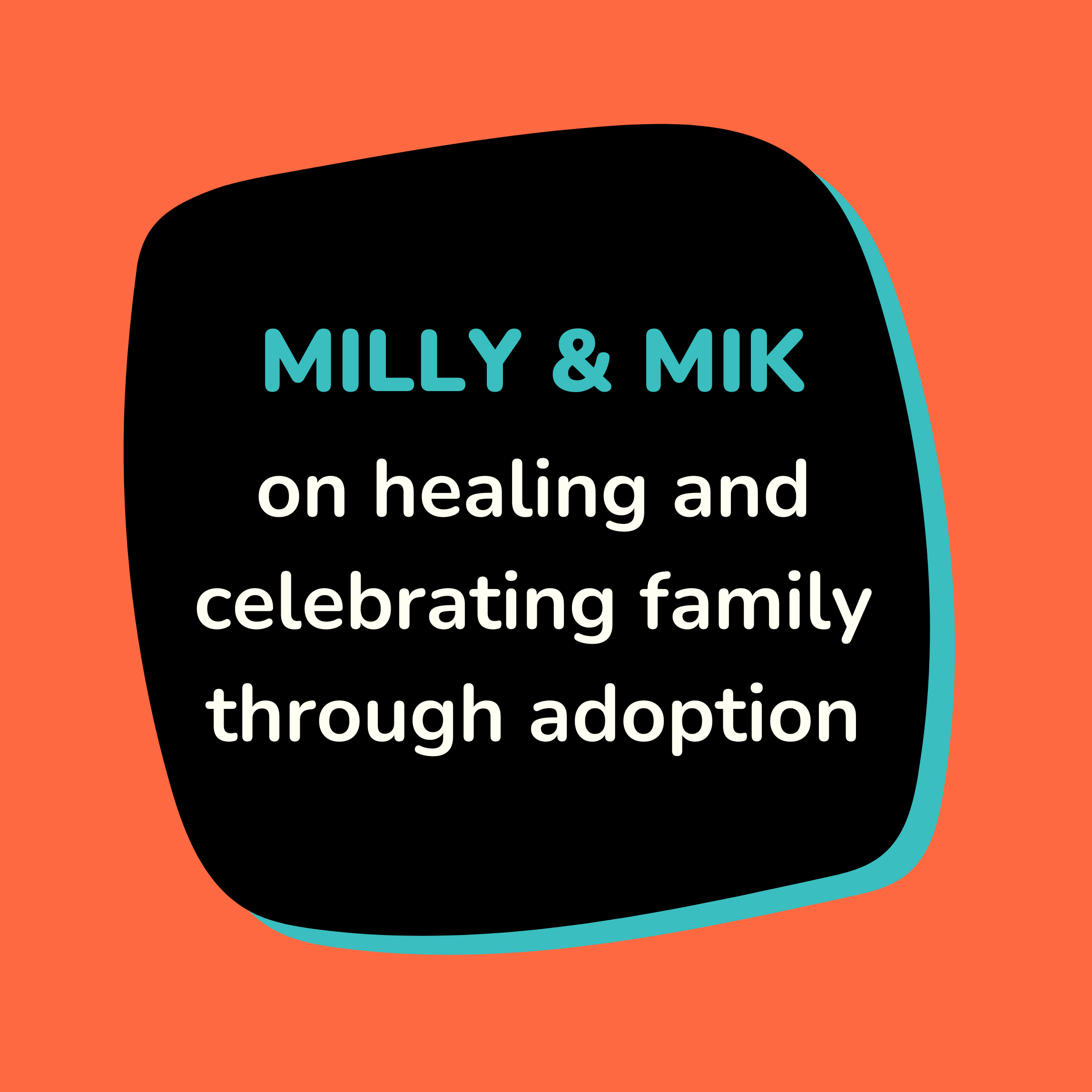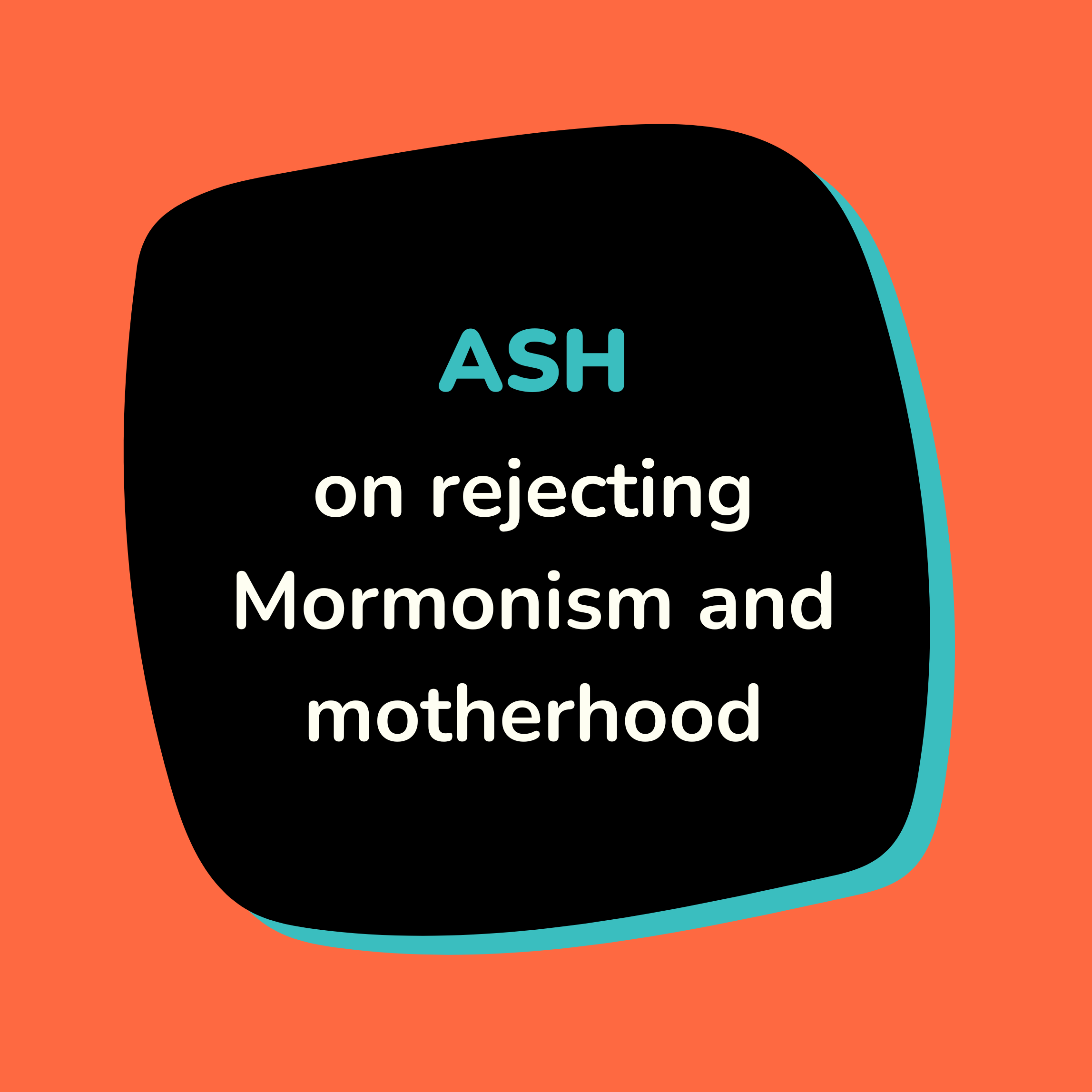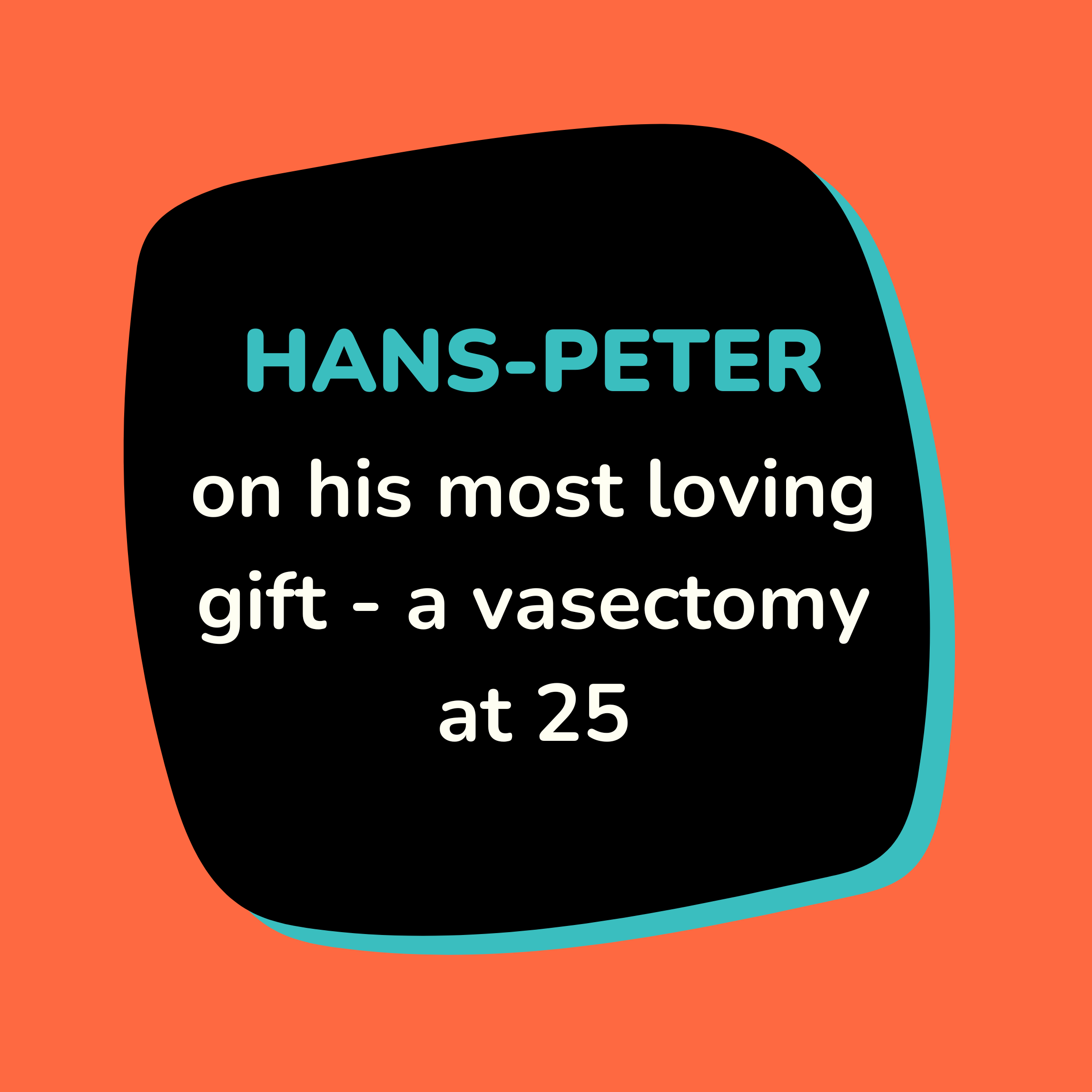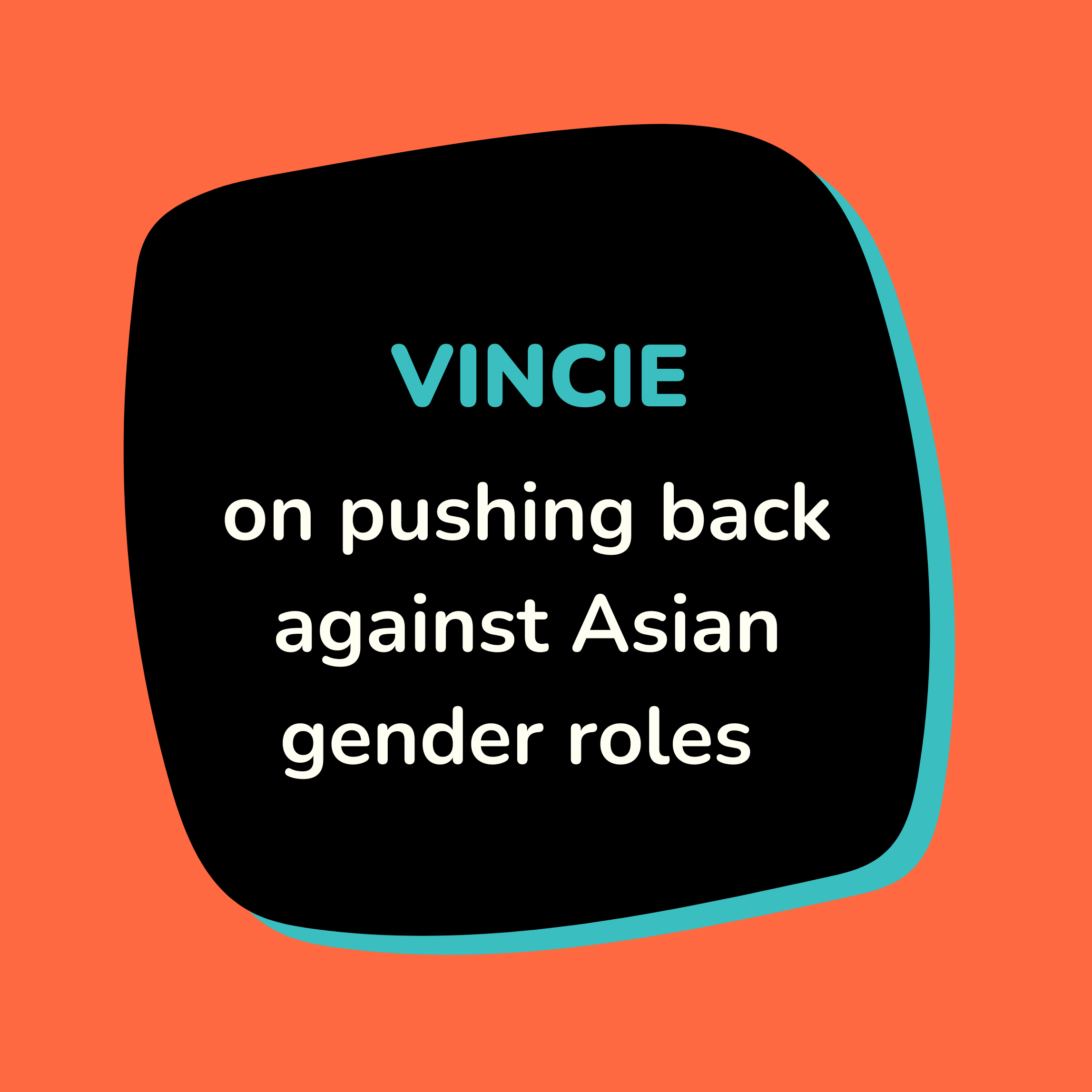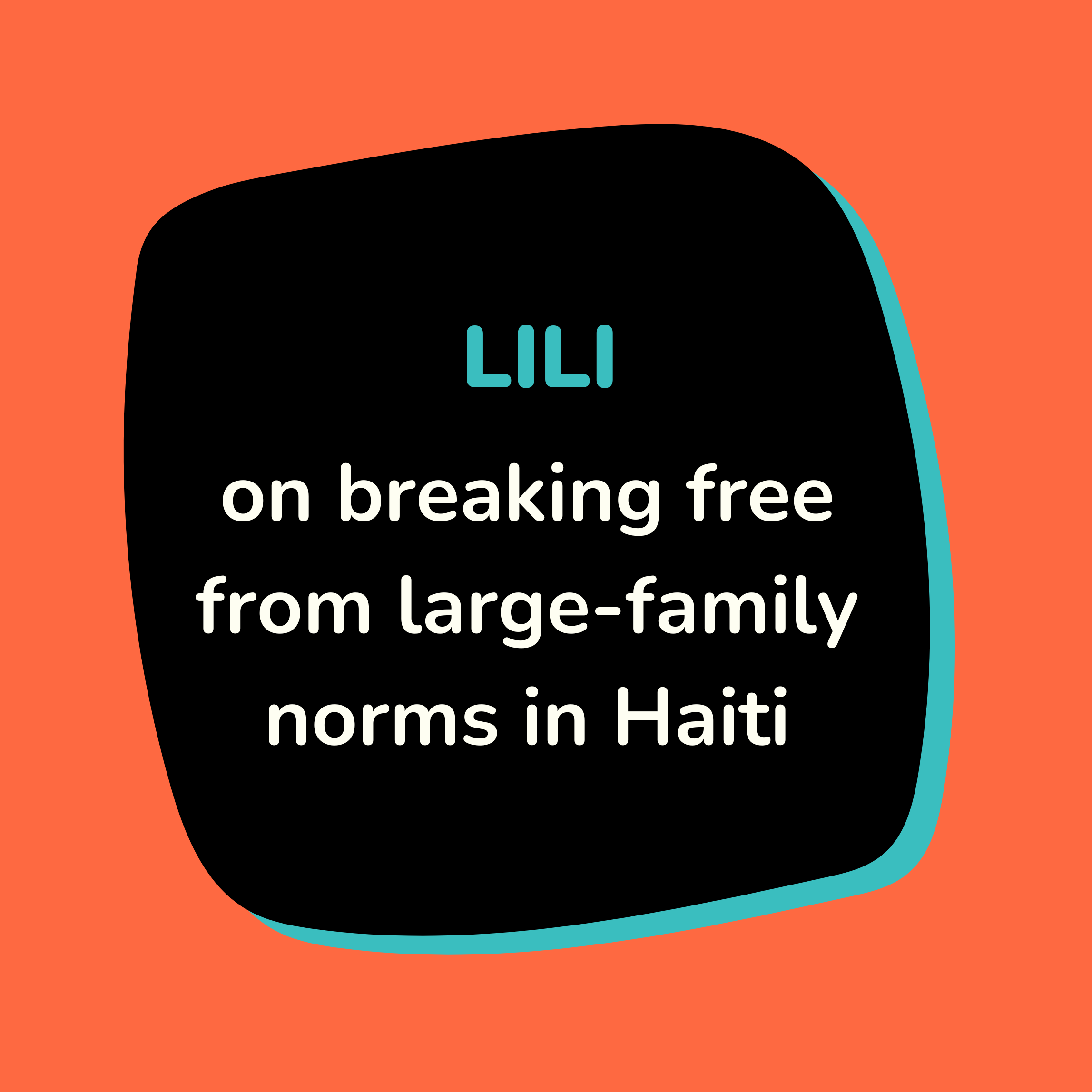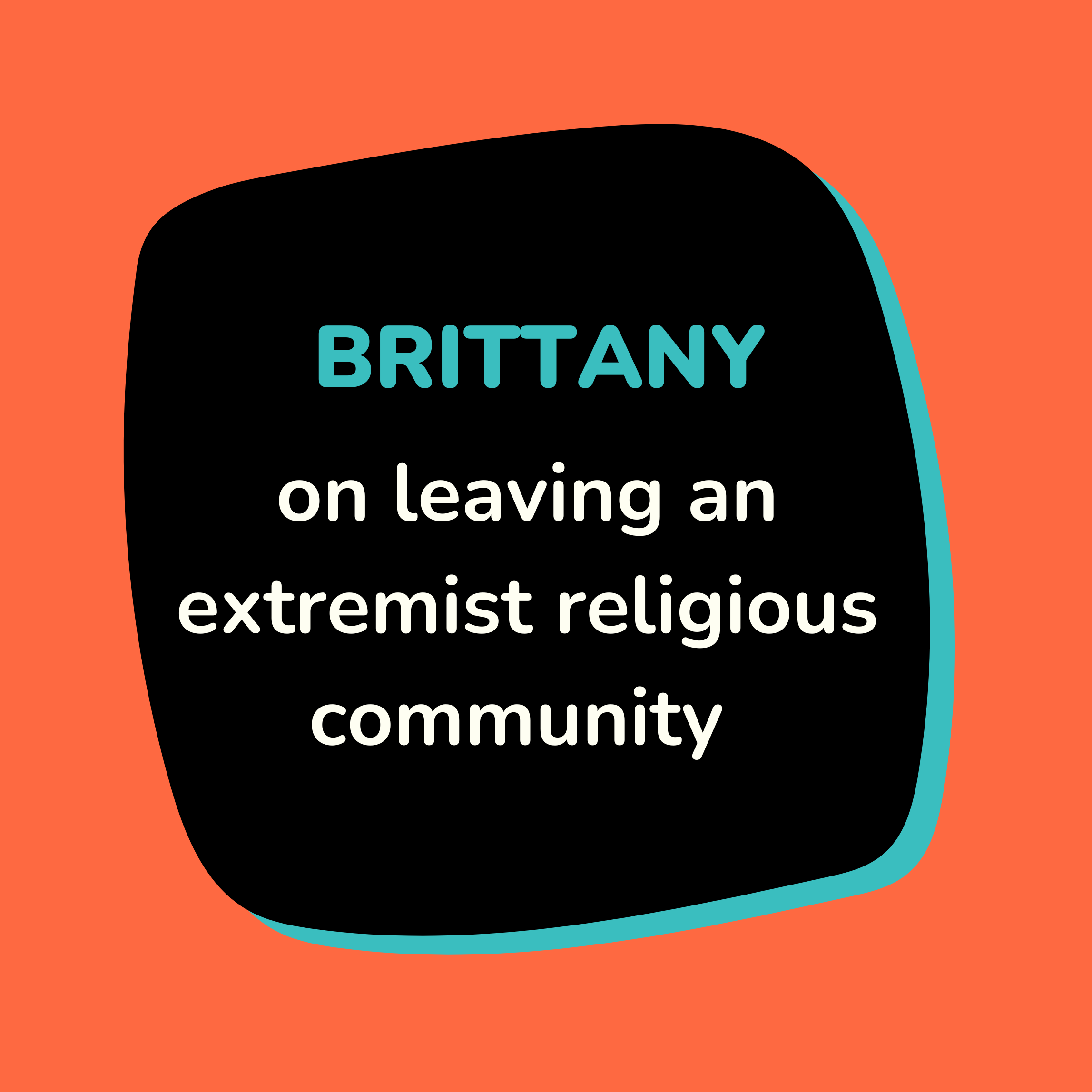Mary Pat - on shaking loose from her Catholic roots
Raised in a large Irish-Catholic family at the height of the 60s liberation movements in the United States, Mary Pat unpacks her many life transformations, from rejecting her pro-life roots and choosing a small biological and adoptive family to becoming a staunch advocate for the rights of people, animals, and the planet.
-
Mary Pat 0:00
When Roe was overturned, here in the States, there was a big pro life push. I even saw a young couple standing with a sign, we will adopt your baby, and it sent chills up my spine. I have an adopted daughter. And I know what it takes to go through the adoption process and how careful it has to be, as it should be. And this idea felt almost like a commodification of children, like, go ahead and have them, we'll take care of them. There was something about that message and I think that it really chilled me, because like a lot of things that chill us, I could feel it inside myself. I was raised in a pro-life context, I was pro-life in college, I know where that's coming from, and that made it all the more frightening.
Nandita Bajaj 1:03
That was today's guest, Mary Pat. Hello everyone, and thank you for joining me on this journey. My name is Nandita Bajaj and I'm the host of Beyond Pronatalism: Finding Fulfillment With or Without Kids, an interview series in which, through intimate conversations with women and men from diverse backgrounds, I explore how they are courageously and creatively navigating pronatalism - the often unspoken pressures to have children, whether from family, friends, or the culture at large. In each episode, I dive into personal stories with people who are forging unconventional pathways to fulfillment, including redefining what family means to them - whether that means being childfree or childless, having biological kids, adopting, or fostering children or animals, or creating close-knit communities of friends and loved ones. Well, welcome to our show, Mary Pat. It is so wonderful to have you here today.
Mary Pat 2:02
I’m delighted to be here. I love the spirit of this podcast. I think we can learn so much through personal stories and narratives. So, yeah, already a huge fan of this podcast.
Nandita Bajaj 2:16
And you're absolutely right about the power of storytelling. People connect to other people through the stories that they see themselves represented in. And we want this podcast to be just that. We want this to be a real exploration of some of the deepest questions that we ask ourselves and that we are faced with when making some of the most important choices in our lives. Well, let's begin with our first question. How did pronatalism show up for you in your life?
Mary Pat 2:48
Well, first of all, until I met you, through the program in humane education, in the master's program, I honestly did not know what pronatalism was, even though I am the poster child for pronatalism. I was raised in a large Irish Catholic family. I am the oldest of seven children. My mother is the youngest of 10. All of her siblings that did not become priests went on to have many children. I have dozens of first cousins, etc. So, although I didn't know the phrase,. I was raised in a very pronatal context. I grew up never questioning that the best way to live was to have as many children as you could have. I grew up in a couple of different cities, but I spent formative years in Buffalo, New York. I lived in a little neighborhood that was full of families like mine. And I can distinctly remember going to friends' houses, later on in my life - 'later on' meaning like by the time I was old enough to go on my own to people's houses like fourth or fifth grade. And some of these families would only have one or two kids and I could hardly believe it. It felt like a foreign country. Their houses were well-organized and clean. There was kind of a quiet in the house. It was an experience of just feeling like, Wow, there is this other way to live. But it didn't appeal to me, because I was so accustomed and so comfortable in this other way, because I was the oldest. I helped with little ones. We were always excited when my mother was pregnant yet again. I was born in 1957. Okay, so this was also a time where the 60s were going on. There was this era of sort of free love and revolution and antiwar demonstrations. There was a lot of cultural upheaval. It never actually touched this area of, for us anyway certainly, of any kind of awareness of what the impact of having all these children, all these American children, was having on the planet, not at all. That wasn't even part of the revolution or part of the conversation. If anything, we were kind of social Catholics. and often there was a real ethic of doing good deeds, of being socially conscious. But that often meant kind of helping other people with large families, you know, like food drives and things like that. And so, even in terms of the media, okay, even in terms of the movies that we loved, there were things like, Cheaper by the Dozen; Yours, Mine, and Ours; any kind of situation where there was a large family. And by large, I would say, more than four. To this day, all of my siblings have two or three kids. And my mother, who is still alive, will continue to say, It's a good start. Like, three kids is a good start. Well she feels, I think, a little let down that none of us have followed suit in this kind of constant procreation. And so I just assumed it was the norm. And when I deviated from that, I went to Catholic College, a lot of people there had big families. I was a Peace Corps volunteer in Niger, West Africa. A lot of people there had large families. It was a Muslim country, and many people had more than one wife. There were children everywhere, children in the compounds. It really wasn't until moving back to New York, being in graduate school, becoming socially conscious, sort of beyond that bubble, becoming aware of the ways in which having a lot of children looked very different for different people that didn't have agency to choose that. It was really, honestly, in my probably mid to late 20s, before I woke up to any real downside,
Nandita Bajaj 6:59
right. And as you were waking up to this in your 20s, again, during the time where there were so many liberation movements going on, what led to that awakening? Did you meet someone? Did you see other people living different types of lives that kind of made you rethink the large family model?
Mary Pat 7:25
Okay, so I have a story that my sister and I love to tell of us sitting on our sofa. We were probably like 10 and 12. And little kids are running all over the place. Some of them belonged in our house, and some were neighbors. It's like, constant steady stream. And we were having a conversation about, How many kids do you want to have? But this was a little bit of a radical question for the two of us. And I think one of us said, Maybe I'll have one. Because we do have one cousin who's an only child, and we were always a little envious of her, like, she kind of had the life there. And so I think I said, Maybe I'll just have one. And then my sister, I think said, I might not even have any or maybe I'll have one. Or like, maybe I'll have two. And we're having this conversation, like thinking about it. And from the kitchen, comes the voice of my mother saying, you'll have as many as the good Lord sends you. There we have it. And we were both, she couldn't see us, we're like rolling our eyes, Oh no we won't. So I think there was already a little seed planted. And I will say even now that I'm happy to have been part of a big family. And I never hoped to have one. I never hoped to have all those children. I love my siblings. I love all my cousins. And yet, did it ever occur to me not to conceive children? I don't know. I honestly don't know. I was already in my early 30s when I got married. I always had been very interested in adoption. And so I think in my mind, I thought - and I want to go on record as saying I would think very differently about this now and my own children think differently about this - if I can't have kids, I'll just adopt them. And I wanted to say something about that, okay, because right now, when Roe was overturned here in the States, there was a big pro-life push. I even saw a couple standing with a sign, a young couple, We will adopt your baby. And it sent chills up my spine. I have an adopted daughter, and I know what it takes to go through the adoption process and how careful it has to be, and as it should be. And this idea of, that felt almost like a commodification of children, like go ahead and have them. We'll take care of them. There was something about that message. And I think that it really chilled me because, like a lot of things that chill us, I could feel it inside myself. I was raised in a pro-life context. I never saw things from a woman's sovereignty point of view. I saw everything as we have to do whatever we can to protect a fetus, basically. I totally believed that; it felt to me like the socially conscious position. I was pro-life in college. I know where that's coming from, and that made it all the more frightening. And so I think it was, in my mid-to-late 20s, it was more of a political understanding of what legalized abortion meant. I had had experiences where friends in high school and colleges had dangerous abortions, because even though it was legal by the time I was in college it wasn't pervasive. Like it was hard to find in certain areas and things like that. So I do think that I had an awakening around the legal right to an abortion and the ways that not having that was impacting women. I feel like that is what woke me up to this, sort of the other person, other than the baby. I know, that probably sounds almost unimaginable now. But that was my frame. And so until I became more politically aware in general, and began really recognizing how I aligned politically, I was also still working overseas, I was working in refugee camps in my late 20s. And there was a different level of poverty and lack of agency than I had ever really witnessed before. And women were often the ones having the least agency in some of those situations. I think all of that combined to make me just really shake loose from a very single-focused orientation toward children. Really looking at the rights of those children that are being born. I mean there's this whole landscape that had not opened up for me, that slowly over time, through political activism and human rights work, I came to embrace another view through intellectually grasping ramifications, and looking at the politics of all this and how, I mean, women and men and vulnerable populations. And I have to say that the Catholic Church, this was also a time of loosening from that, which I can only say now, because my dear Uncle Frank who was a priest has passed on. And, you know, there were so many personal connections to the church, even though I stopped believing; even in college, I was not really a practicing Catholic, even though I went to a Catholic college, there is an awakening that should always happen, I feel like, as we begin critically thinking about our beliefs, which is what happened for me. And even that, I began to look at the political force of the Catholic Church, and the way in countries that were identified as Catholic - Central American countries, South American countries, some European countries - where women were having lots and lots of children, because birth control was against the church. And there's a kind of theocracy that was happening, where that sort of religious belief became enmeshed in what was legal and illegal. So all of that did not sit well with me. So I think by the time I was navigating, I wasn't even really navigating, I was just kind of going along. What seemed like navigating to me was deciding not to have seven. It was like, well, reduce.
Nandita Bajaj 13:44
This is such a powerful story, because I think it speaks to so many people's experiences. Majority of the people in the world subscribe to some form of religion or another. And, of course, Catholicism is one of the most common ones that stands against contraceptives and abortions, and as you said women’s sovereignty. And, at some point, you decided to limit yourself to what seemed appropriate so that, in some ways, already pushing back against cultural norms of pronatalism, which told you in your upbringing, that the only way to fulfill your destiny, and God's will, is to have as many children as you possibly can.
Mary Pat 14:33
Exactly right. And I think that the idea of limiting family size was supported in my mind by the feminist movement, certainly, like in my 20s and early 30s - the idea that became very clear to me, that there was another role for women besides having children. And I was also of the generation where people thought they could have it all. I'm gonna have kids, and I'm gonna work. And pretty soon it became necessary for most families to have two working parents. So then there's this whole dynamic where there's two working parents and the kids are in daycare. And the women haven't really put anything down, are still the primary caretakers of the children, holding the emotional life of the family and holding a full time job, where there are these adult expectations, and by this, like different lobes of the brain, like what is needed to be raising children, paying attention, etc. And then all these expectations, have this done by five and, you know, I think there's a lot of disillusionment that happened, like in the 80s and 90s around this - that unless you're very wealthy, and you're having in-house help or something like that, this model, it did not serve women. I think sometimes it did not serve children. And it was too much. So yeah, I think that was also part of it, Nandita, is like women - and of course nothing is in isolation so men and everybody - just began to realize that it wasn't tenable for most people. I mean, my mother, and most of the women in our neighborhoods, these are not wealthy people at all. But the mothers all stayed home, pretty much everybody.
Nandita Bajaj 16:22
Yeah, this idea that women can do it all, and the double burden of care that that put on women - though on the one hand, the aspiration to have a career and doing something other than child-bearing and child-rearing which, in and of itself, can be a very fulfilling pathway for some. But for others who did want to do other things, it wasn't 'instead of' but it was 'in addition to' you know, as we look in in our work, I think there was some inherent pronatalism even within that movement that assumed that well, of course all women are gonna want to have kids, but we also want this, this, and this. I think motherhood remained a destiny in that assumption.
Mary Pat 17:14
There's a lot of denial about it, you know. I remember, after having Liam, my oldest child, going back to work after like, six weeks or something like that. And there was no setup. So there's this pressure to nurse, for example. I'm, like, trying to do the right thing. And I have this, like, memory of myself, like kind of weeping in the lavatory stall, at the World Trade Center, pumping. That was the reality, and I was like, What am I doing? Do I actually want to be here? Do I actually want to be there? It felt like we do not have the policies in place, the way some countries do, where there is a gentle period of parenting. If you are going to parent a child, you have some financial support to stay home with that child for a while. This is really not the case. It's six weeks, usually. And then you can take some without pay for those that can afford it. But you just kind of soldier on, whatever is going to make it helpful and in any way sustainable. And pretty soon, you're not doing anything, right? Not really at work. You got a six week old baby somewhere out there that feels like, wait a minute, is that right? I found it an era of great disillusionment. And I loved this little being, Liam, my son. And I just felt really conflicted around what my expectation was and the level of denial that I had brought into that situation. Even though I was hardly a teenage mom. I was in my early 30s. There's so much that I hadn't considered. I feel like my conditioning was still propelling me that, one way or another, you have to make this work. But, you know, I'll say that I feel like it's harder now, like the whole mommy sphere on social media. There's so many blogs. And I've heard this from, you know, younger people having kids, like they just can't even go on Instagram because the way that your family life can be kind of objectified, commodified, sold as a beautiful picture. That did not really exist. I would bury my phone under a pillow somewhere if I were trying to raise little kids now, I would not. I think it has a harmful effect. And that's just not true. It can't be a real life if that's what it looks like. It's not one. It's just not one. Some days, they just move at a glacial pace, it's like, they're never going to end, when you're in a household with little children. You know, now it looks like, Oh, the time goes so fast. But from dawn till dusk can feel like 10 years in a snowstorm with little children.
Nandita Bajaj 20:11
Yeah, that's just absolutely fascinating and so helpful also to hear the contrast of what you saw in your own life as a new mother, and then you being able to reflect on that, seeing that now, being able to have those conversations with your own children about this. Where are you at now with things both as a parent and as someone who can see past pronatalism and the harms of it?
Mary Pat 20:39
Let me just say, I am so grateful to be doing the work I do, and also to have taken your course, and to be as aware as I am of the personal and global impact of having a child. I feel like there was a little unexamined assumption within myself, pretty much through my 30s that people that didn't have children couldn't. So even though I knew people, I never asked them why they didn't have kids, which I'm glad I didn't, because now I know, we should also ask people, why did you have kids? Like, not just why didn't you? Well, this is a little aside, I do remember a friend of mine, okay. We always had this thing with the Catholics and the Protestants, like the Protestants didn't have as many kids as we did. And so we always thought they were losing. They're kind of on the losing team. Like we had more, we had bigger groups, and we were gonna win and I remember a friend of mine in high school, who was an atheist and he was also maybe one of my more intellectual friends. And he came into our living room, and we have this big photograph above our fireplace of my whole family. And he was like, That's gonna be illegal some day. Where did he get that? I was like, What are you even talking about? What could he possibly mean? He's like, you can't have that many kids. He didn't use the word sustainable, but he was like, That is not gonna fly like. I was like, Oh, brother. So I feel like I have thought of that conversation with him. So when I think now, if I hear of somebody like in my generation, and I do have friends that have lots of kids, I feel like my friend, I feel like him looking at that picture like, Whoa, at some point this has to stop. And, you know, everybody has their own choices and all that. But I just feel grateful to have this perspective, because I do have three children. And whether they decide to have children or not, I have no feelings about that, I only have feelings that they get to decide. And I feel like they really know that. And when I compare it to the blinders that I had at their ages, I feel like their mindsets, their level of awareness, their appreciation of what makes a family, of issues of who can marry whom, of how we can live our lives, this is just blown out of the water from when I was growing up. And so I just feel deeply grateful to be alive right now. I feel grateful to have kids that are well aware of their options. And they know that their extended family is Catholic, but that is mostly a cultural influence for them. They are not bound in any way the way we were by sin. There are a lot of sins to navigate. Talk about navigating. I also want to say that having adopted a child, I felt another kind of awakening where, when we adopted Jing from China, we had made a decision a long time ago, having lived in certain countries where children without the protection of a family were at the mercy of some of the worst influences, particularly girls. And so my partner and I had made this decision. And when we were able to do it, we adopted her from China, mostly because some of the other countries we were more familiar with, Vietnam and Cambodia, there were moratoriums because of some trafficking issues. And because I thought I understood the One Child Policy in China. And that was why there were so many Chinese daughters being abandoned. You were not allowed to bring a child to an orphanage, you know, you had to abandon the child. It was against the law to do so. And that's what we did. And I couldn't be more grateful that she's my daughter. And at the same time, there was another awakening that happened there in a fuller understanding about what was going on in China, with requiring people to only have one child. There were so many forced abortions. It became a money-making proposition that so many people from Western countries and other countries were adopting Chinese daughters. And I feel like I understand how difficult it is for some people to confront issues around reproduction, around pronatalism, around childbirth, adoption, etc., because I experienced that when I became more well informed much later when more information came out about what had really gone on, how much trafficking there actually was. And this was a way I feel that if I had been better informed - I would always want Jing, of course - but I'm just saying, like, from a more global perspective I really had a naive idea about what was going on in China at that time, when I considered that a safe place, good for the children. It wasn't that we had decided, Oh we're desperate for a third child. It wasn't that. It was a different motivation. She and I have talked about it quite a bit. You know, she lost her culture. She's Chinese American. She's living in Taiwan now, and she's studying Mandarin as a teenager. But talking about navigating, there were so many things. I just jumped in with blind faith and then was left to much more carefully navigate as time went on. So when I see people saying, We'll adopt your child, I mean, it brings me to tears even thinking about it.
Nandita Bajaj 26:52
I see that - I have the same experience. It's a complete commodification of children. And, as you said, it's such an abusive approach to childbirth and children's rights. And elevating the wellbeing of children, it's not even in the picture in those cases. So thanks so much for for sharing that. And another aspect of pronatalism is this belief that you can only find real love through a biological connection to a child. And for you, having experienced real love with all your children, did you ever feel societal judgments on you? Did people ever ask any questions about, how are your experiences of connection with your biological children versus your adoptive child?
Mary Pat 27:44
Yeah, there's a couple of things in there I want to talk about for a second. One is the idea of, you know, you have a biological child, so there's a bond and then you have this adopted child whom we didn't meet till she was one. We got the referral picture for Jing. It came in the FedEx. This little one by one little referral picture. Later, we got some more pictures of her. We looked at that picture, and I fell in love, like I was looking into the face of a newborn baby. That was our child. And we were like, We're supposed to go get her. I mean, this is not even our child. Somebody else gave birth to the child. But this was the overwhelming feeling of love and protection. I have to get there before anything happens to her, just like having a baby in a nursery somewhere, and she was already one. The thing I will say about the difference between having a biological child and adopting a child is when we adopted Jing, I was fully myself. I found childbirth to be really difficult, postpartum to be really difficult, for me anyway. you're putting your body to this use, like, right when you have a child. And so adopting, I felt I hadn't anticipated that. I was like, wow like, I'm totally myself. I can really enjoy this. I am not constantly trying to sleep and all that. And there was certainly some pushback. I had a few people say, There's plenty of kids here in the States to adopt., So there's that kind of pushback. Like when we're looking at all children as if some children are worthier than others for adoption, why would you do that. And to that, I would try to build a little bridge to just say that part of it was being what we considered to be part of a solution. In a country where there was not a system in place, as imperfect as it is here in the States, we have foster care. We have adoption agencies, we have systems. This was not the case. Everybody was in an orphanage. That was my belief. And it's to a certain extent true. And so, when people would say that I always got my feathers ruffled, because I felt like no one child is worthier of a family than others. That was kind of the extent of it, for me it was more about the fact that she was Chinese. I did find there was also general, total lack of awareness around the one child policy here which we didn't know the full story, but we knew as much as was available to know in 2004.
Nandita Bajaj 30:21
Yeah, I think that's beautiful, that's what I wanted to get at was, this belief and this misconception that adoption is the last resort if nothing else works out. And I think it should just be the most natural and normal thing for people to do - not to perpetuate abuses, like within the pro-life movement, or abortion bans, or propagandas to make money - but when the need is real and when the children really do sincerely need a loving family, I just wanted to get at that is how beautiful of a choice it is and how it should not be looked at as an altruistic choice. It should just be seen as the most natural choice. Just like you felt when you saw her passport-sized photo. And that's something I really also want to help - for us to transcend the biases that we have about what makes a family and what makes love real.
Mary Pat 31:28
I love that. And I also love that even now that there aren't kids living here right now, I feel like there is something so beautiful about having space in your life for other people, children, beings, animals. Like, I think a lot of timesthat space gets filled up with what is required. If you're going to be like a caring parent it just requires so much of you. You're always thinking about, like, Oh, they need a doctor's appointment, or have they eaten, or do they have shoes that fit, whatever. It's just, like, constant, like a river of thinking in order to care. And it's a pleasure to have a life where there is space, if something is needed. I love that. And I'm in my late 60s, and I'm just now experiencing that, really.
Nandita Bajaj 32:20
Oh, that's just wonderful. Well, that seems like a really nice place to end. This was such a beautiful conversation. And thanks so much for taking me through your life from right from the beginning to where you are now and how you've navigated all of these different pressures and conditioning. Thank you so, so much for joining me today.
Mary Pat 32:44
My total pleasure.
Nandita Bajaj 32:46
That's all for today's episode. Thank you so much for listening. What did you think of this episode? Do you have your own story you'd like to share? Check out the show notes to see how you can get in touch with me. Whether you'd like to share feedback about the show or a particular episode, or whether you'd like to join me on the show to share your own story, I'd love to hear from you. Thank you so much again for joining me today as we collectively discover and celebrate the many different pathways to fulfillment beyond pronatalism. Beyond Pronatalism is brought to you by Population Balance - the only nonprofit organization advancing ecological and reproductive justice by confronting pronatalism. This podcast is produced and hosted by me, Nandita Bajaj, with the support of my production team: Josh Wild, Elisabeth Strunk, Alan Ware, and Kirsten Stade.
More like this
Share your story!
Would you like to be on the show to share your own story? We’d love to hear from you!
Join our mailing list
Subscribe to our newsletter to be the first to know when a new episode is launched.


